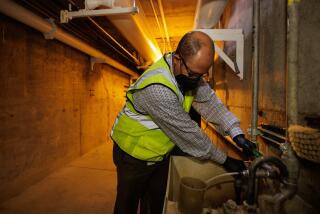Drug Policy Chief Downplays Cost of Jail Test Programs on States
WASHINGTON — The nation’s top drug policy official said Wednesday that it would not cost that much for states to impose drug testing programs in their criminal justice systems, as the Administration wants to force them to do.
“While every state already performs drug testing at some stage, these new requirements would ensure a more reliable and accurate testing program,” said Bob Martinez, director of the Office of National Drug Control Policy.
“In response to critics who charge this will cost too much, states would not be required to spend more than 10% of the block grants they receive from the Bureau of Justice Assistance,” Martinez said at the Parental Awareness and Responsibility Inc. conference in Tampa, Fla.
Next year, Bureau of Justice Assistance block grants are expected to total $405.25 million, making the states’ required drug-testing expense $40.5 million.
Under the Administration’s proposal, a state would have to adopt policies and implement drug testing in its criminal justice system if it wanted to receive a bureau grant. The states would save money in the long run, Martinez said, because the program “will make the criminal justice system more efficient.”
The idea of forcing the states to conduct such testing is not new. The Administration has sent the proposal to Capitol Hill three years in a row, but it has never been adopted by Congress.
Martinez’s office on Wednesday gave new descriptions of what it wants, hoping that it would calm legislators who are worried about the economic bind faced by many state governments.
“We’re not necessarily calling for a tremendous amount of testing, just a policy that would have some testing in each jurisdiction,” said Frank Kalder, the office’s budget director.
The $40.5 million the states would be required to spend is far less than adequate programs would actually cost the states, according to estimates made by the drug policy office in January.
“A conservative cost estimate based on criteria which exceed the minimum requirements of this proposal places the average cost per state at $5 million,” the office said in a memo to the Senate Judiciary Committee. That translates to $250 million for all 50 states.
The proposal’s bare minimum requirements, the January memo said, were “testing of any number of individuals from the following populations: arrestees, probationers, parolees, prisoners and employees.”
The National Conference of State Legislatures and the National Governors’ Assn. have opposed federal mandates of programs that cost the states money.
Four states--Kansas, Oklahoma, Hawaii and Rhode Island--have minimal drug testing programs, and more than a dozen other states have testing at just three or four levels, Kalder said.
More to Read
Sign up for Essential California
The most important California stories and recommendations in your inbox every morning.
You may occasionally receive promotional content from the Los Angeles Times.









